- By Dan Veaner
- Around Town
 Print
Print  Have you ever seen a guard llama? Drive past Angel Tree Farm on Scofield Road on the Lansing/Groton line and you are likely to see one, standing guard over the Engels family's alpaca herd. A family affair, three generations get in on the act at Angel Tree Farm. Carol Engels, a Kindergarten teacher in Lansing, husband Jay, an accountant, their son Tyler and daughter Ashley, and Carol's parents Mal and Ellie all pitch in.
Have you ever seen a guard llama? Drive past Angel Tree Farm on Scofield Road on the Lansing/Groton line and you are likely to see one, standing guard over the Engels family's alpaca herd. A family affair, three generations get in on the act at Angel Tree Farm. Carol Engels, a Kindergarten teacher in Lansing, husband Jay, an accountant, their son Tyler and daughter Ashley, and Carol's parents Mal and Ellie all pitch in.They started the herd just over a year ago. The family lived on the farm for six years. "We were looking for something we could do on the farm that was manageable, something we could do together," explains Ms. Engels. "They're very easy animals to care for in the sense that they are clean, they use one common pile and they're grazers. So their feed is second cutting hay, some pellets and water." They are cousins to llamas and distantly related to camels.
Females are pregnant for 11 months. "So they are pregnant for their whole life," explains Ms. Engels. "They don't really know any different, but they don't tend to be as friendly for that reason. The majority of that time, too, they have a baby by their side." They separate the boys from the girls to control breeding. "There's an alpaca registry where all the animals are registered. They have microchips in their ears. When you breed you make sure you know what you're breeding with what."
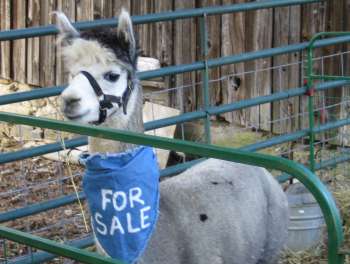
Don't tell him what his bandana says!
The Engels make income from selling animals and from their wool. "The wool from our last season was sent off to the mill and we are waiting for it to be returned. It's fun, because you'll actually be able to buy wool from the animal you'll be able to see. They are also selling animals already. Last weekend Morgan, a male, wore a "For Sale" bandana on his neck. "Don't tell him what it means!" joked Ms. Engels. Prices on their web site range from $500 for unproven male to $28,000 for a proven female.
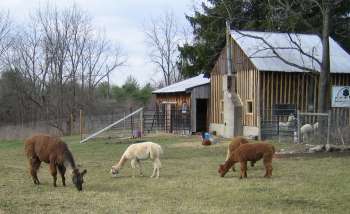
The guard llama (left) with her charges
The llama really is there to guard the herd. Llamas instincts are different from the more passive alpacas, and they are more likely to fight an attacker, which in Lansing might be coyotes or domestic dogs. "If the dog were to get in she would chase the dog, and it wouldn't surprise me if she stomped on him," says Ellie Hunter. "If anything unusual happens she pushes the alpacas back towards the barn. So she's valuable."
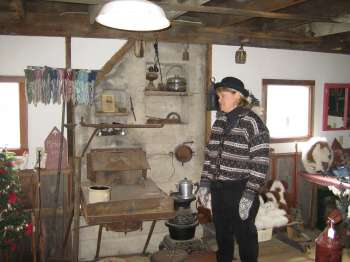
Blacksmith accoutrements still adorn the shop, surrounded by alpaca items for sale.
A shop where you can buy wool and items made from it is built inside an old blacksmith shop. "We left as much of his stuff as we could," says Ms. Hunter. Her husband Mal did the carpentry to turn the barn into a store, and has done other carpentry on the farm. They are looking for some blacksmith tools to decorate the shop. "It's so clever," Ms. Engels says of a worktable with drawers to keep tools and supplies in. "He used explosives boxes for drawers. This one is permanently in the wall so we thought well, we'll save it." They also put a window between the shop and the barn so visitors to the shop can see the animals in their stalls.
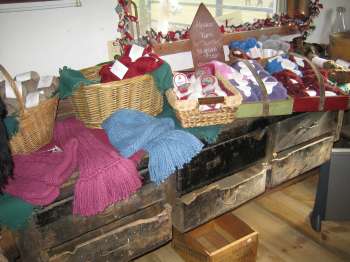
This table has been preserved. Drawers made from boxes that ammunition came in were used for drawers.
The Engels are already taking their male animals to shows, and they have won ribbons. "The shows were to give Ashley some experience with the animals," explains her Mother. "Also, if you have males and you want to bring people to your property for breeding fees, you want to try to get ribbons for your animal and prove their confirmation and quality."
"We were looking for something to do with the farm that fit the property, fit our lifestyles, and also was an investment. It is an investment livestock," says Ms. Engels. "My husband is an accountant, and there is a very big tax advantage to alpacas. They're expensive animals, but the return is great once they start producing. If you buy a female and she produces a female, if you bred properly she's worth more than the mother was."
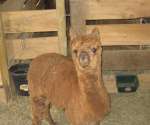 Everyone in the family has a job. Ms. Engels has learned to be the vet, so she gives the animals shots every six to eight weeks, plus worming shots and other care. Husband Mal does the accounting and manages the investments and purchases. Her parents help with the daily care every night. Her Mother has gotten involved with the fleece, yarn and knitting. The children help with the daily chores and Ashley shows the animals in competitions.
Everyone in the family has a job. Ms. Engels has learned to be the vet, so she gives the animals shots every six to eight weeks, plus worming shots and other care. Husband Mal does the accounting and manages the investments and purchases. Her parents help with the daily care every night. Her Mother has gotten involved with the fleece, yarn and knitting. The children help with the daily chores and Ashley shows the animals in competitions.
Winter is the alpacas' favorite season. They have the coat for it. Summers they spend most of their time in the barn under a fan. They are sheared for wool in May. They look very different when they are sheared. "Neighbors come up and say, 'did you get new animals?'," laughs Ms. Engels. "'No they're the same animals, they just got a new haircut!' They're very funny looking." Some of the animals produce up to seven pounds of fleece, worth about $25 per pound.
Last weekend was the Engels' second open house weekend. A stream of people came through, with much interest in items for sale in the shop. Last month around 60 people came, and they expected more this weekend because the weather was so much better. They also open their farm to the public by appointment. Sometimes if they're working in the yard they'll put the "Open" sign up, and another at the end of the Road so passers by on Peruville Road (34B) can see it and people come by. They eventually hope to build their web site at angeltreefarm.com and sell items on line as well as in the shop.
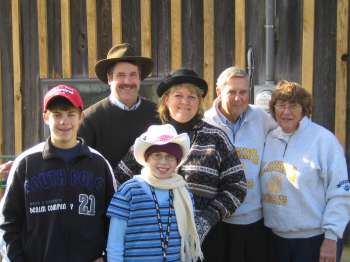
(left to right) Tyler, Jay (dark hat), Ashley, and Carol Engels, Mal and Ellie Hunter
All in all raising alpacas seems to be the perfect thing for this family. It is a great way to keep the family together with a common goal, the work isn't too taxing, and it is a great investment. Not to mention the employment benefit: it keeps that guard llama in a job.
----
v1i19



